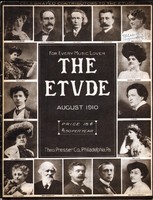BY GUY S. MAIER.
Theodor Leschetizky is but one of the many who has demonstrated to us that teaching is no mere drudgery and that it is not without its own great reward. While Leschetizky is truly distinguished as a pianist, his fame rests more securely on his abilities as a pedagog. Many of our present-day concert pianists owe much of their success to him.
By dint of constant observation and careful inquiry into all manner of "methods" and ways of obtaining results at the keyboard, Leschetizky has drawn a few irrefutable conclusions, the development of which in his pupils places him very high among living teachers. One of these deductions concerns that simple and yet inadequately employed process of complete concentration during the practice hour. On this point Leschetizky is inexorable. A phrase must be played once, twice, or at most three times; every detail of tempo, fingering, pedaling, etc., decided upon instantly, and the whole then played with surety and expression—from memory.
"But," argues the music student who practices eight hours daily, "that is impossible. I must repeat a phrase dozens of times to memorize the notes alone, or 'to get it into my fingers' and then I repeat it a few dozens (or hundreds) of times to make it technically and musically perfect."
By beginning with only a measure or two, and concentrating one's entire intellectual forces on that measure, it can be memorized at once. Whether the memory consists in a mental picture of the printed notes or whether it be muscular, a "finger" memory guiding the fingers to the right place, any pupil with a grain of talent and an ounce of common sense can commit measures to memory by very few repetitions. The modern idea is—less keyboard work, more mental work.
Every moment of practice is spent with the mental faculties focussed upon the one object, to the exclusion of all others. As Leschetizky himself says: "One page of music thus memorized daily will give you a trunkful of music in a year." That each succeeding effort at complete concentration makes the next one easier, is a fact not to be overlooked. How can we expect to acquire the indispensable qualities for public performance which we have not gained in the practice hour, namely, entire control of the will and utter forgetfulness of self and environment?
Why will not our present-day aspirants to pianistic fame realize that it is not the number of hours spent at the piano, ruining mind and muscles in senseless repetition, that will raise them above the average player, but that success springs from thoroughness and rapidity linked with conservation of brain and brawn in daily practice?



